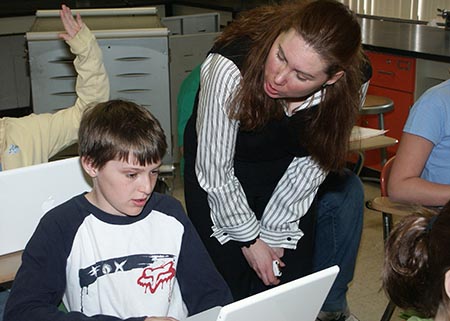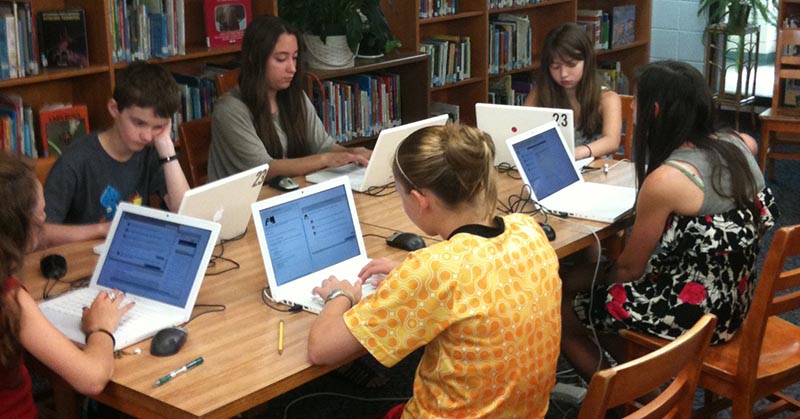Evaluating The Development of Scientific Knowledge and New Forms of Reading Comprehension During Online Learning
This intervention project was funded by the North Central Regional Educational Laboratory/Learning Point Associates and was conducted from January – June, 2005. Members of the New Literacies Research Team worked in collaboration with Jonna Kulikowich from Pennsylvania State University and Stacy Lyver, a seventh grade teacher from Somers School District in Somers, Connecticut.
Project Overview
The purpose of this study was to evaluate the effects of varying levels of intensity of Internet integration into seventh grade classroom science instruction. Intensity of integration was defined by the duration of Internet access as well as the duration of instruction in the new literacies of online reading comprehension. Four randomly assigned sections received different intensity levels of Internet integration during a twelve-week unit on human body systems.
The intervention involved varying intensities of Internet Reciprocal Teaching. With this model, strategy instruction supported locating, critically evaluating, synthesizing and communicating information while using the Internet. Teachers provided guided demonstrations, think-alouds, and scaffolded practice of strategies. In small groups, students participated in shared dialogues to initiate strategies and shared their thinking while acting as models for one another.

Science instruction and strategy support was guided by interactions with The Human Body Project Website and Human Body Systems Blog. Jill Castek’s online conference presentation at the International Reading Association features examples of lessons where students crafted online encyclopedia entries about famous respiratory scientists, exchanged strategies for publishing information online, researched heart facts while taking notes, and clarified and summarized content for a respiratory poster project.
Instruments used to evaluate the effects of intensity of Internet Reciprocal Teaching and duration of Internet access on reading comprehension and science learning included the following: Online reading comprehension was measured with two instruments including the Online Reading Comprehension Assessment with Instant Messaging (ORCA-IM) and Online Reading Comprehension Assessment with Blog (ORCA-Blog); (b) Declarative science knowledge was measured using multiple choice/short answer unit tests about the digestive, circulatory, and respiratory system; (c) Conceptual science knowledge was measured using concept maps of the human body systems; and (d) Traditional reading comprehension was measured using the Degrees of Reading Power (DRP) test (Touchstone Applied Science Associates, 2004).
Findings
Click here for the final NCRELReport
Internet integration in a seventh grade science classroom resulted in higher achievement levels in online reading comprehension. This was true for both the ORCA-IM and ORCA-Blog; two assessment instruments with good psychometric properties. Each assessment required students to locate, evaluate, synthesize and communicate information on the Internet.
Conceptual knowledge development in science was greater among students in the high-intensity Internet integration group and the control group.
Consistent with new literacy predictions, we found no association between either of the measures of traditional reading comprehension (January and June DRP) and the measure of online reading comprehension (ORCA-Blog). No evidence of gains on a test of traditional reading comprehension following treatment.
Summary: Internet integration generates greater online reading comprehension ability. Our results suggest it is better to have no integration or high-intensity integration of the Internet for developing concept knowledge, but not low or moderate intensity integration. Our study also provides preliminary data that suggests online and traditional reading achievement tests are not correlated.
For more information, view the grant proposal online here or email principal investigators Dr. Donald J. Leu or Dr. Douglas Hartman.
Please use the following reference to cite this project:
Leu, D. J. Jr., Castek., J., Hartman, D., Coiro, J., Henry, L.A., Kulikowich, J., & Lyver, S. (2005). Evaluating the development of scientific knowledge and new forms of reading comprehension during online learning. A grant funded by the North Central Regional Educational Laboratory, a subsidiary of Learning Point Associates (LPA).
